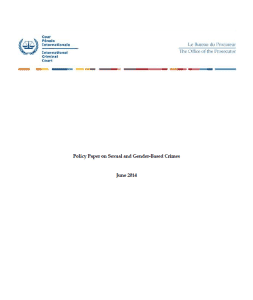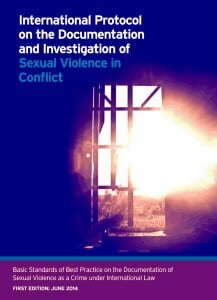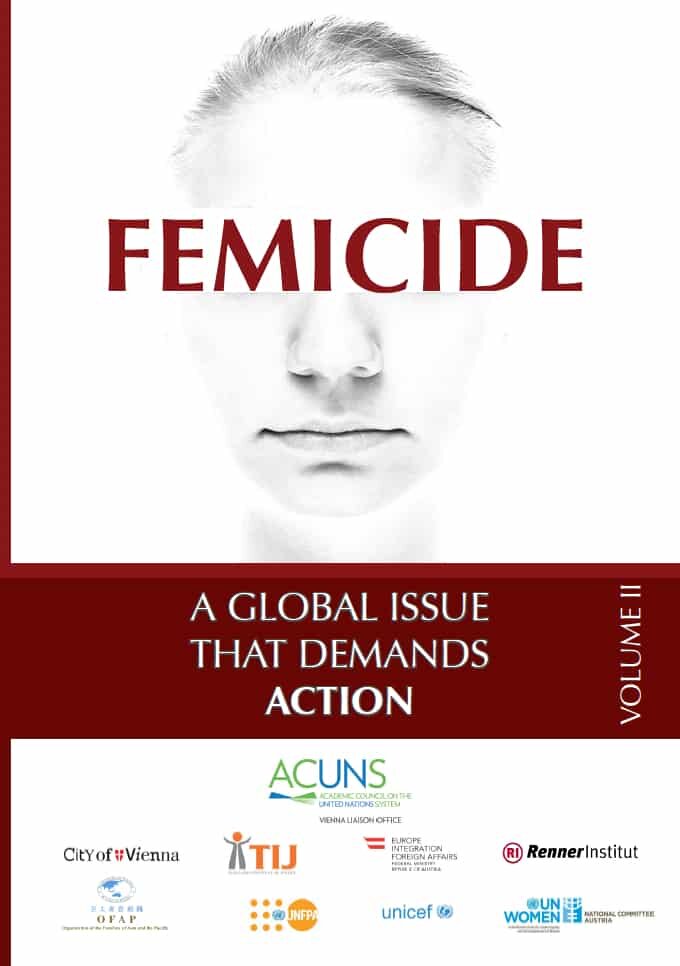
“We must keep chronicling the fragility of women’s lives all over the world. My gratitude to the writers who have been brave enough to expose female infanticide, burning of widows, rape, and other instances of violence against more than one half of the human race.”
Erica Jong
Author of “Fear of Flying”
2015 Crime Commission Resolution
Femicide Volume III — Targeting of Women in Conflict
ACUNS (Academic Council on the United Nations System) takes great pride in sharing with you the third volume of our Femicide Publication which we have been releasing annually since the first Femicide symposium in November 2012. Each year, on the occasion of the International Day on the Elimination of Violence against Women, the Vienna Liaison Office of the Academic Council on the United Nations System (ACUNS) has organized a symposium on a different theme related to the most extreme forms of violence.
Expert group on gender-related killing of women and girls was held
Bangkok, 11-13 November 2014
Femicide is the ultimate form of violence against women and girls and takes multiple forms. Its many causes are rooted in the historically unequal power relations between men and women and in systemic gender-based discrimination. For a case to be considered femicide there must be an implied intention to carry out the murder and a demonstrated connection between the crime and the female gender of the victim.1 So far, data on femicide have been highly unreliable and the estimated numbers of women who have been victims of femicides vary accordingly. Femicides take place in every country of the world. The greatest concern related to femicide is that these murders continue to be accepted, tolerated or justified – with impunity as the norm. To end femicide we need to end impunity, bring perpetrators to justice, and every individual has to change his/her attitude towards women.
To date, the United Nations has not adopted a resolution directly addressing gender-related killings. According to the declaration on the Elimination of Violence against Women, violence against women “means any act of gender-based violence that results in, or is likely to result in, physical, sexual or psychological harm or suffering to women and girls, including threats of such acts, coercion or arbitrary deprivation of liberty, whether occurring in public or in private life”.2 This definition fails to include explicitly violence that can lead to death and consequently misses an important component of violence against women.
On the occasion of the International Day for the Elimination of Violence against Women, the Vienna Liaison Office of the Academic Council on the United Nations System (ACUNS) organized a one-day symposium on femicide in the United Nations (UN) Office in Vienna, with the kind support of the Austrian Federal Ministry for European and International Affairs; the Permanent Missions to the UN Office at Vienna of Austria, Argentina, Philippines, Thailand, and the United Kingdom of Great Britain and Northern Ireland; Small Arms Survey and the Vienna NGO Committee on the Status of Women. Member State representatives, social scientists, NGO representatives, law enforcement officials, prosecutors and feminist activists had the opportunity to speak about femicide, explain its meaning and causes, and presented examples of best practice in fighting femicide.
Participants agreed in the VDF that there are at least 11 forms of femicide and that the UN must do more to conduct research on the extent of these killings and evaluate programmes set up to combat femicides.
The conference in November 2014 will further these discussions and actions. We look forward to your participation and contributions.
1 Kumari, Ranjana. 2013. How do we Fight Femicide. Best Practices and Strategies.
2 General Assembly Resolution 48/104
Documents & Publications
UN & Relevant Documents
Relevant UN documents, conference information and publications
Individuals & Organizations
Contributing Organizations
List of Individuals & Organizations who contributed during the initial phase of the work against Femicide
Document Vault
A Femicide Blog
Search our “Femicide Blog”, a growing vault of articles on a global issue that demands action.
Find information about promising practices, academic papers, articles, activities and more.
Main Documents Relevant to the November Meeting in Bangkok
UN Documents - PublicationsUNODC Documents for the 11- 13 November 2014 Femicide Working Group Meetings

Main Documents
Contribution from NGO & Academia: E-CN15-2014-CRP5_E.pdf
Summary of Replies from Countries: E-CN15-2014-CRP4_E.pdf
All UN Documents will be posted at this location for the November Meeting:
http://www.unodc.org/unodc/en/
Femicide: A Global Issue that Demands Action
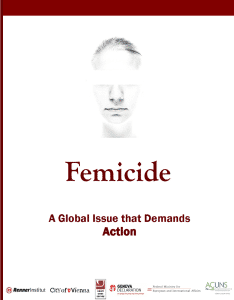 Download the PDF document here:
Download the PDF document here:
Download
Additional Documents
UN Documents - Publications - DiscussionsICC Policy Paper on Sexual and Gender Based Crimes
International Protocol on the Documentation and Investigation of Sexual Violence in Conflict
Femicide Flier
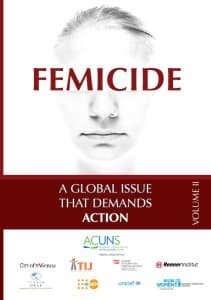 Download the print-ready flier
Download the print-ready flier
Do You Have Documents To Add or a Discussion To Contribute?
Do You Have…?
2. Documents developed by your NGO for the community engaged in this issue?





